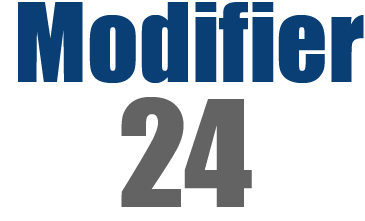Modifier 24 (Unrelated evaluation and management service by the same physician during a postoperative period) is to be used to report an unrelated E/M (evaluation and management) service during the global period of a previous procedure. The expression “same physician” includes other “same-specialty physicians”. This means that a surgeon covering post-operative patients for his/her partner does not bill for services provided. Physicians in the same group practice and in the same specialty must bill and be paid as though they were a single physician.
AMA and CMS differ as regards what is included in the global surgical package, which creates confusion for providers. To bill correctly, providers must clarify whether their payers follow CMS or AMA guidelines. For CMS’ Medicare payment, unless a return visit to the operating room is required, all medical and surgical post surgery complications are included in the global payment and cannot be separately billed. Treatment of wound infections and other complications cannot be reported. CPT defines the surgical package as “typical” post operative care.
Correct use of modifiers makes claims processing easy and providers receive the due reimbursement without any hassle. On the other hand, incorrect use of modifiers will result in payment denials and other complications.
A surgeon can report atypical post surgical care for medical complications using modifier 24 for E&M services. In this case, the complication diagnosis code has to be used first on the claim form. It is important to clarify with your payer that this is in keeping with its rules. If the patient is seen by other physicians during the global period, they need not use modifier 24. Only the surgeon who performs the operation, and his or her same specialty partners/covering surgeons need to use modifier 24.
Let us look at the correct and incorrect uses of modifier 24.
Correct Use
- Use on an unrelated E/M service that starts the day after a procedure, when the E/M is provided by the same physician during the 10 or 90 day post-operative period.
- Append it to the E&M procedure or eye exam.
- Use modifier 24 on the E/M if documentation shows that the service was entirely for treatment of the underlying condition and not for post-operative care.
- Use it on the E/M code when the same physician is managing immunosuppressant therapy during the post-surgery period of a transplant.
- Use it when the same physician is managing chemotherapy during the post-operative period of a procedure.
- Use it when the same physician provides unrelated critical care during the post surgery period.
Incorrect Use
- Modifier 24 cannot be used for a surgical complication or injection because this treatment is considered part of the surgery package.
- It cannot be used to document treatment of wound infection, consider this part of the post surgery care.
- Cannot be used when the surgeon has the patient admitted to a skilled nursing facility for a condition that is related to the surgery.
- Cannot be used when the medical record documentation does not clearly indicate that the E&M was unrelated to the surgery undergone.
- Do not use modifier 24 outside of the post surgery period of a particular procedure.
- Cannot be used on the same day as that of a procedure.




